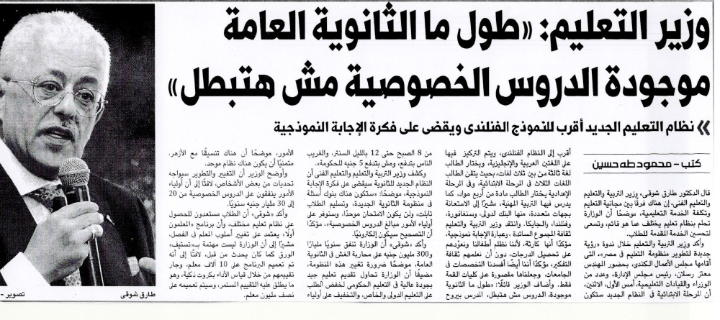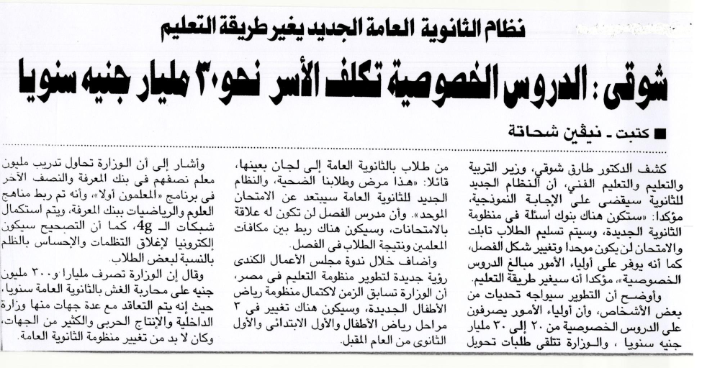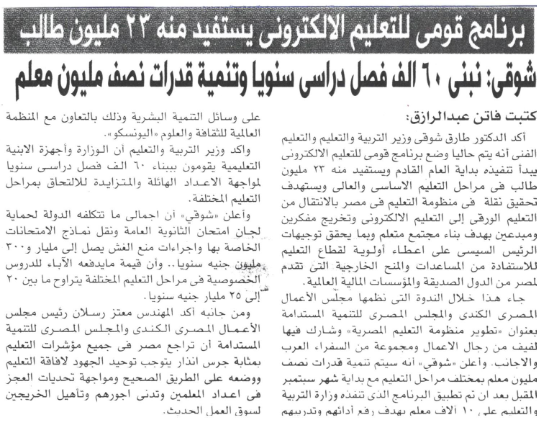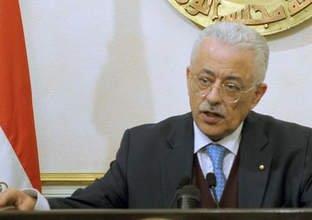
Date
Speaker(s)
Designation
Presentation
Description
The problem of the quality and development of education in Egypt is the biggest challenge facing the current economic situation, where all previous efforts have not succeeded in finding realistic plan to develop it. Therefore, problems have been accumulated and leaded to deterioration of the current condition. This resulted in the delay of the Egyptian ranking in the quality indicators of education. However, despite all these challenges, there is still a state of optimism about the efforts and the plans of reforming the educational system and putting it on the right track, in order to build the future of Egypt and achieve the desired progress and growth. In this context Canada Egypt Business Council and the Egyptian Council for Sustainable Development organized an event with H.E. Dr. Tarek Shawky to discuss the new vision for educational development in Egypt.
In the opening remarks, Eng. Motaz Raslan welcomed all members and guests, then he mentioned that there is no doubt in the fact that all the crises that Egypt has suffered from were a result of the deterioration of the educational system. He pointed out that Egypt is ranked 139th on the global level in the quality of education, although education is the only means of progress. Also, there are 21 million students who are in need for educational development, especially that there is a situation of inability to provide employment opportunities for graduates and having an educational ranking of 134 out of 180 countries; so there must be a stand and educational system must be developed to achieve economic progress.
He further mentioned that the construction of a new educational system to build personal standards is deeply needed, in order to get our graduates to the labor market, and that the reform will not happen in the short run, due to the weak budget of education and the low confidence between society and education. Therefore, during the current period a vision to reform the educational system is needed in order to regain the previous Egyptian ranking in place again.
H.E. Dr. Tarek Shawky, Minister of Education, stressed that the Ministry’s philosophy should be changed at present and transformed from a deep bureaucracy into a scientific and technical ministry supported by international standards, to provide qualified service to students. He further mentioned that the Egyptian education is the responsibility of the whole nation, especially to keep pace with the challenges of contemporary education and the successive developments in the techniques of communication, information and digital knowledge, and to follow-up with the development of cognitive skills. The ministry will also focus on adding training for teachers and development of capacity in the areas of technological education and the adjustment of methods of measurement and evaluation.
The Minister of Education added that we should think about the children in poor areas who did not find a sufficient opportunity, noting that the Ministry of Education has one million and 700,000 employees, and pays about 69 billion salary costs from the ministry’s budget. He pointed out that the system is complex and has a large number of problems, most of which are administrative and governmental, but there are many solutions to the development of teaching and learning, as the ministry is trying to solve the problem of densities through collecting data from numbers of schools and the housing box where there is currently about 10 millions of primary students who are served by 360,000 teachers. He discussed that the average number of students is 40 in the classroom and not 160 and the ministry has directed educational buildings for places that need schools, explaining that there is poor distribution between students and teachers. If the teachers are distributed equally to the students, there would be a teacher for every 15 students which is a high percentage, adding that the enrollment rate of students in the kindergarten stage is less than the global average of 80 percent. Also, the curriculum and the method of explanation have not changed in 30 years, stressing that under the modern technological programs, change in the ways of examination is highly required.
H.E. Dr. Tarek Shawky explained that the students are ready to get different learning systems, stressing that the program “teachers first” is a program to change the teacher’s style in the classroom, and the ministry is not interested in staining paper as it was before, pointing out that the program needs time. This has been distributed to 10,000 teachers and evaluated by measuring smart card performance, which is called continuous assessment and will be circulated to half a million teachers. The program also focuses on the graduates’ qualifications to be creative thinkers who respect diversity and accept others. He explained that the primary stage is closer to the Finland model, where teaching includes the western language, the English language, and the choice of the third language, so that the student will have the privilege of 3 languages at the elementary level. While in the preparatory level, the student selects a material from 4, beside the vocational education, pointing out that there are several supports from different global institutions as the World Bank, Singapore, Finland and JICA.
The floor was then opened for questions and answers sessions, where several ideas and suggestions were discussed considering the educational system and how to design a new and innovative educational plan outside the available budget until education in Egypt is promoted.






























